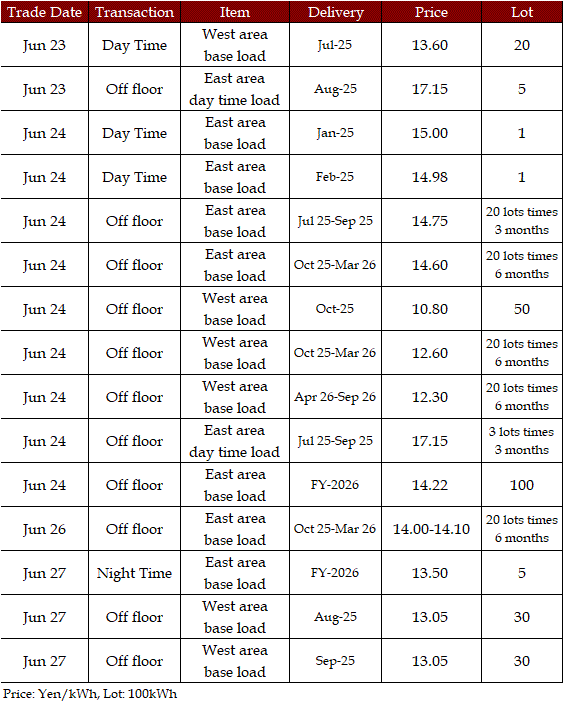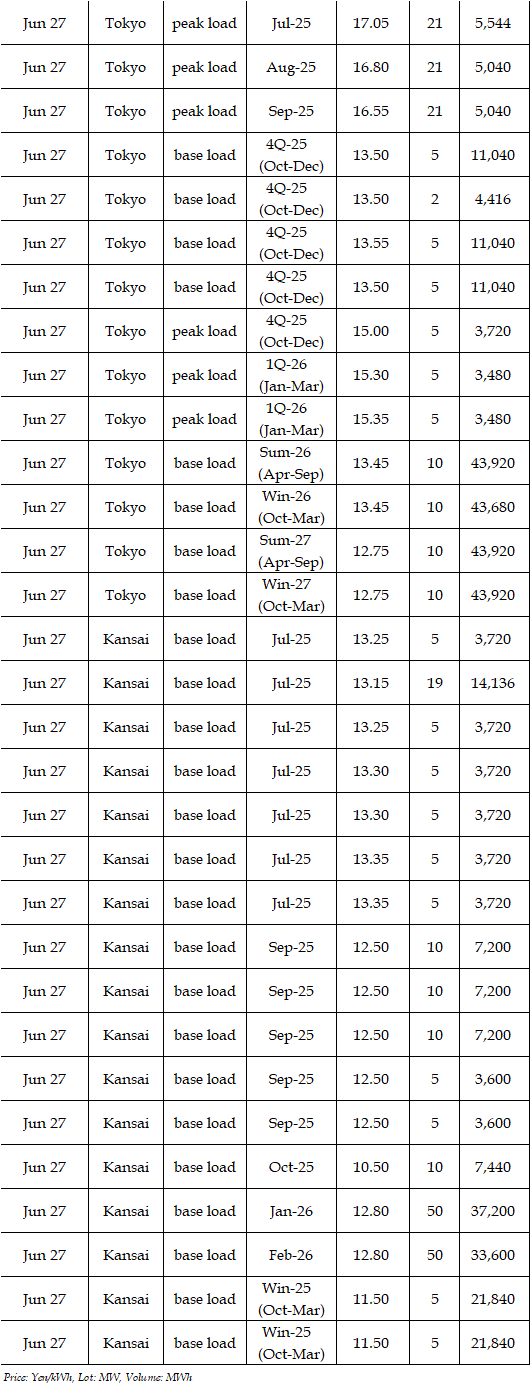|
In the day-ahead market on JEPX (Japan Electric Power Exchange), the 24-hour spot power prices on a weekly average basis for Jun 23-27 delivery stretched gains from the previous week in both East Japan (50Hz) and West Japan (60Hz). The temperatures were lower than the previous week. But rain clouds blanketed the entire Japan mostly during the week, and a massive drop in solar power supply from the previous week lifted spot prices further led by day time. On top of that, rainfall gave a boost to humidity, providing a bullish impact on the price trends. The sultry weather kept high utilization of air-conditioners despite alleviated heat waves compared with the previous week.
In Tokyo and Kansai, the key areas in East Japan and West Japan, the 24-hour average posted a difference in favor of the East by Yen 0.67 for Jun 23 delivery, Yen 0.38 for Jun 24 delivery, Yen 1.29 for Jun 26 delivery, and Yen 1.43 for Jun 27 delivery. For Jun 25 delivery alone, the West outperformed the East by Yen 1.10.
The fuel market trends in the fourth week of June were detailed as follows.
DES Northeast Asia spot LNG prices dipped to $13 per mmBtu for prompt August 2025 arrival as of Jun 26, down about $1.30 from the end of the previous week (Jun 20). A ceasefire agreement between Israel and Iran dragged down natural gas prices in Europe steeply, and thee LNG market in Northeast Asia followed suit. LNG prices tentatively slipped off the $13 mark in the middle of the week. The Ministry of Economy, Trade and Industry (METI) announced on Jun 25 that Japan's LNG inventories for power generation stood at 2.25 mil mt as of Jun 22, up 110,000mt from a week before. The figure was up both from 2.13 mil mt as of end-June last year and the average of past five years at 2.10 mil mt.
FOB Newcastle thermal coal prices in Australia stood in the low $106 level for July 2025 loading as of Jun 26. The level was down more than $6 from the end of the previous week, mirroring a drop in crude oil and LNG prices.
In the crude oil market, WTI crude for August 2025 stood in the mid $65 level per barrel as of Jun 27 morning while Brent crude for August 2025 was trading in the high $67 level. WTI and Brent collapsed by nearly $8.50 and around $9, respectively, from the end of the previous week. Crude futures deepened losses as the ceasefire deal between Israel and Iran alleviated excessive fears over a blockage of the Strait of Hormuz that could disrupt crude oil supply.
The actual highest price during the week was at Yen 34.71 in three areas including Chubu, Hokuriku and Kansai for Jun 23 and Jun 24 delivery. Meanwhile, the actual lowest price during the week was at Yen 1.00 in Hokkaido for Jun 24 delivery.
By area, the weekly average of the 24-hour spot prices was at Yen 11.51 in Hokkaido, up Yen 0.29 from the previous week, Yen 14.68 in Tohoku, up Yen 2.66, Yen 15.50 in Tokyo, up Yen 0.47, Yen 15.07 in Chubu, up Yen 0.90, Yen 14.96 in Hokuriku and Kansai, up Yen 1.22, Yen 12.30 in Chugoku and Shikoku, up Yen 1.62, and Yen 12.17 in Kyushu, up Yen 1.49.
In the JEPX auction, volumes of offers were 1,111.55 mil kWh on a weekly average basis, down 2.9% from the previous week. Meanwhile, bids on a weekly average basis waned by 1.6% to 1,012.56 mil kWh. The weekly average of trade volumes shrank by 2.6% to 783.25 mil kWh.
Power demand in nine areas of Japan during Jun 23-27 was a combined 12,605.44 mil kWh, down 2.3% from 12,902.17 mil kWh during Jun 16-20. The figure was up 6.7% from the corresponding period a year earlier. Demand during Jun 24-28, 2024 after day of week adjustment was 11,813.67 mil kWh.
Deals reported on TOCOM (Tokyo Commodity Exchange) during Jun 23-27 were as below.

Deals reported on EEX (European Energy Exchange) during Jun 23-27 were as below.









In the first week of July, spot prices are expected to stay in a similar range from the fourth week of June. The temperatures are forecast to rise to 32-35 degrees in some parts of southern Tohoku to Kyushu, and this will boost utilization of air-conditioners. But spot prices will likely be capped by ample power supply including stable output from photovoltaic generation, at a time when an increasing number of thermal units are coming back from regular maintenance. In addition, more players are rather heavily hedged with bilateral OTC deals starting July, another factor that will put a lid on spot prices. Under the circumstances, a source at a power producer and supplier said, "I expect the 24-hour average in the range of Yen 14-16 in Tokyo and Yen 13-15 in Kansai. The intraday high will exceed Yen 20, but I'm negative if the market can see Yen 30 or Yen 40."
|
JEPX: System Price (Day Ahead 24 hours)
|
|
Weekday Price
|
23-Jun
|
24-Jun
|
25-Jun
|
26-Jun
|
27-Jun
|
|
24-Hour Ave
|
8.13
|
8.80
|
8.33
|
10.19
|
10.31
|
|
Volume (MWh)
|
687,669
|
658,443
|
690,330
|
676,307
|
632,584
|
|
(unit: yen per kWh) (date: delivery day)
|
|
|

|